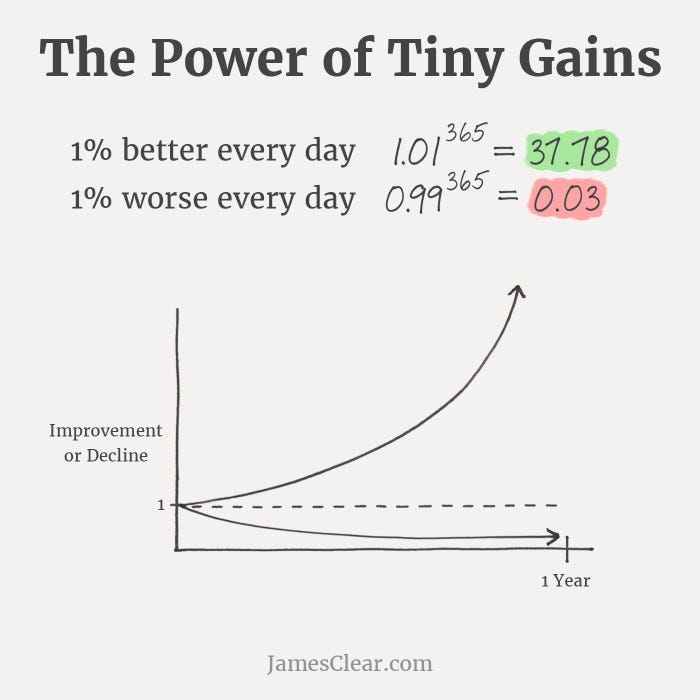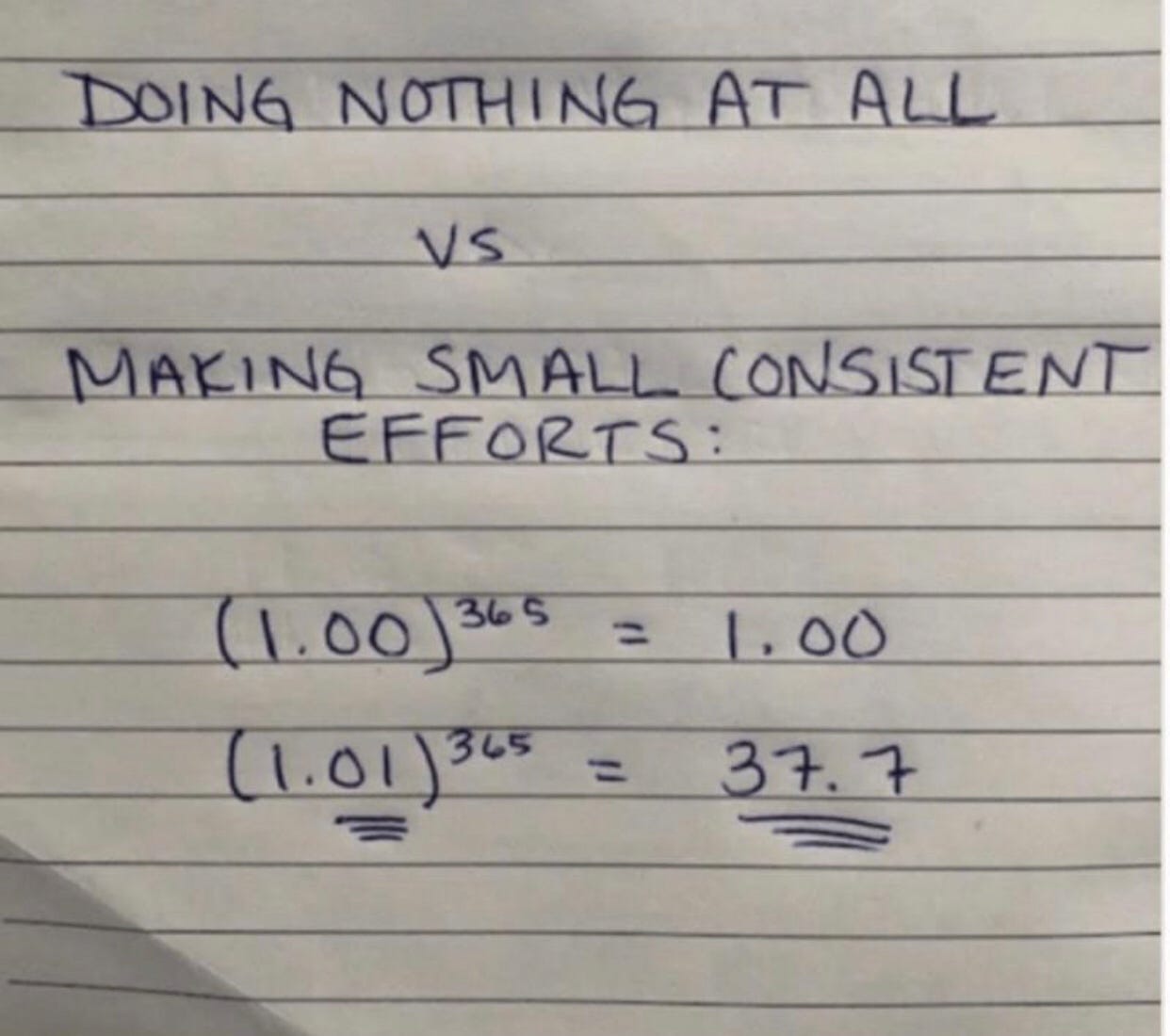Good day to you!
Hope you’re well.
👋 For the new comers, hello and welcome! Our mission here: we want to help people free themselves from rampant consumerism, so that they can dedicate more time, money and bandwidth to be and build. 👉 We want to help you be highly intentional with what you buy.
Habits, and the role of social accountability.
I have good habits, and I have bad ones. Like, I think, everybody.
Few weeks ago, I heard Justin Kan summing up his take-homes from Atomic Habits and it made me want to read the book. Last weekend, I read the book. It starts with this simple yet powerful statement:
The compounding effect
If you get 1% better each day for one year, you'll end up 37 times better by the time you’re done.
Pretty appealing, uh? 👀 And so for the first time in my life, I listed my habits: from when I wake up until I go to bed. This exercise quickly made me realize that 2020 and 2021 - so far- had been a pretty fertile ground for building routines. Staying home day after day during a lockdown of course comes with a plethora of challenges, but not this particular one: building habits. Today looks pretty much like yesterday.
Back to my list. I listed 35 habits. Thirty-five habits that I’ve done repeatedly day after day, without even realizing it, until now. Given that “40-50% of our actions on any given day are done out of habits.” it is not that surprising in itself, what is more is reading what is it you actually repeat every day! I was certainly not intentional about most of them, they just happened to arrive, and well.. they stuck in time. Some have been there ‘forever' ; some are inherently context dependent.
😇 Good habits [positive outcome] : 15 (43%)
😐 Neutral habits : 15 (43%)
😣 Bad habits [negative outcome] : 5 (14%)
Then comes the most interesting question:
Does this type of behavior [habit X] help me become the type of person I wish to be?
To stick in time, habits must align with your identity, who you want to become. And so it is important to 1) regularly come back to these aspirations; 2) keep your identity adaptable and flowing!
About freedom
I recently had an interesting conversation with one of our community members about the importance of habits. She was telling me how much she had been fighting against them, personally and professionally, until now, because their inherent rigidity did not fit with the freedom she was seeking in her life. I used to think that, too. James Clear makes a pretty good point on that topic. For him, “the purpose of habits is to solve life’s problem with as little energy and effort as possible.” Having routines (handle your finances, take care of your health,..) gives you more time and bandwidth, thus more freedom.

About craving and desire
Dopamine is a neurotransmitter that is released in our bodies not only when we experience pleasure, but also when we anticipate pleasure: the wanting area in our brain is much larger and compact than the liking one.
It’s the anticipation of a reward, not the fulfillment of it, that gets us to take action.
📣 Hence our willingness at Objet, to help you be hyper, super intentional in building the most exciting wishlist, that fits with your identity. After all, pressing the Buy button is the fulfillment part, not where you’ll get your dopamine dose from. We’ve got your back! 😎
-
A behavior that is usually associated with consumption (we talked about it in a previous post), the Diderot Effect, applies to building habits, too: a chain of actions, where one triggers the next.
The Diderot Effect states that obtaining a new possession often creates a spiral of consumption which leads you to acquire more new things. As a result, we end up buying things that our previous selves never needed to feel happy or fulfilled.
A solution James offers is to pair a habit you want to do, with a current, existing one:
=> After I [current habit], I will do [next habit].
About the right culture
“Environment is the invisible hand”.
James insists that it is crucial for habits to stick, to join a culture where:
The desire behavior is the normal behavior
You already have something-in common with the group
📣 This is what we aim at building with our community, Objet. Creating a safe and stimulating place to grow, pull each other up, enrich critical thinking, control our desires and stay free.
Commitment to others is powerful. When status and reputation are on the line, you’ll do whatever it takes to commit.
A commitment device is a choice you make in the present that controls your actions in the future.
And for this, your could use help from others. Victor Hugo was a funny example. As he was procrastinating the writing of his next book but facing a tight deadline, he asked a friend to hide his clothes away so that he could not go out of his room.
Let’s not underestimate the power of encouragements in this habit-building journey.
📣 See below the new Buddies feature we’ve been cooking up for you!
The art of showing up
In the end, success of habits lies in their frequency, not the amount of time you allocate to perform each one.
Never miss twice. The first mistake won’t kill a habit, it is the repeating one that will. Rebound quickly. Reaffirm your identity.
Bonus
The new habits I want to introduce to my life, starting March 1st (yeay I know, you’ve been craving to know)
- write for an hour in the morning
- express a non-religious blessing out loud before breakfast
- do nothing for ten minutes in the morning, ten in the afternoon
What’s new in 📲 the app
Make yourself accountable with Buddies 👯♀️
Create a group of buddies who will hold you accountable for your consistency and progress.
Once in the group, they will receive updates when you complete your daily routine and will know when and what you’ve just acquired, or wish to acquire. Yep, they’re watching out 👀 . A WIP feature that we’ll nurture with your feedback, folks.
What’s new in💡 the library
📖 Atomic Habits by James Clear
📰 The Diderot Effect: Why We Want Things We Don’t Need - And What To Do About It by James Clear
🎙 Albert Wenger (from USV) interviewed by Yancey Strickler (former cofounder & CEO of Kickstarter)
How do we free people up, so that they are better in control of their attention?
Economic freedom (you don’t have to work to survive : universal basic income?)
Information freedom (control the devices instead of being controlled by them)
Psychological freedom (develop some mindfulness practice)
Our library is collaborative, so please don’t be shy and recommend the great content you’ve digested recently!
What Objet is all about.
Intentionality. Only purchase things that will make your life 10x better.
Freedom. You own the decision-making process.
Elegance. Create an inspiring environment to thrive.
We are a community of part-time serious, part-time not-so-serious, but above all non-judgmental folks ready to change our lives for the better. We are excited to meet you!
Have a beautiful day out there 🌿
Mathilde





